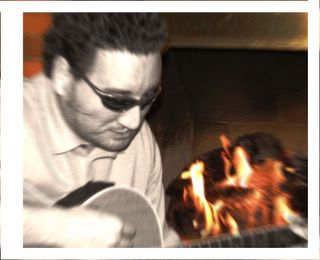If you are a subscriber to the Marcus Engel Newsletter, you may remember September's newsletter which included my thoughts on forgiveness. While writing this newsletter, I began to realize just how many facets the whole idea of forgiveness has! Yet for me, the single biggest aspect that has influenced my life is the idea of forgiveness as something the survivor(I hate the word "victim") does for himself/herself. For example, yours truly has forgiven the offender who took his sight. Not because he asked for it, not because I don't want him to carry the weight of it, but because I, me-I want to be able to move forward with my life. That's really tough to do if I'm bogged down in the injustice of the act.
After the newsletter went out, I received an E mail response from Dr. William Samek, a mental health professional in Miami, FL who happens to be a subscriber to the Marcus Engel Newsletter. He raised some really great points and I was so happy to get some feedback on this subject from a professional-someone who has lots more than personal experience with forgiveness. From Dr. Samek's points and my own exploration of forgiveness, I realized it is such a vague concept I could probably write a newsletter on each facet for each month for years to come! But, that's probably going to get old, so I'd just like to now give you Dr. Samek's thoughts on the matter...and thanks, Dr. Samek, for the food for thought!
Marcus,
I am a clinical and forensic psychologist. I read your book a few years
ago and I found today's Newsletter interesting food for thought. I
specialize in treating sexual abuse and therefore I have thought over
the years a lot about the issue of forgiveness.
I agree that getting to the point of letting go of the anger is a very
important part of recovery from trauma. I agree that it can be difficult
to do and that it takes time. I agree that not letting go of the anger
only hurts the victim. It has no impact on the abuser/offender.
However, I do not call letting go of the anger, which is an important
part of recovery for a victim, forgiveness. I believe that forgiveness
has a component of forgiving the abuser, of saying you no longer blame
him or you do not hold him accountable any longer. Christian counselors
often preach the need to forgive the offender and turn judgment over to
God. I think this is not good counseling and not good theology.
Forgiveness is good and it is appropriate when, and only when, the
offender repents. Only when the offender truly repents, not just in
words but also in changed behaviors, is forgiveness appropriate, in my
opinion.
I think we need a better word for letting go of the anger than
forgiveness. Forgiveness has a meaning, I believe, that includes letting
go of the blame placed on the offender. I think recovery for a victim
requires letting go of the anger and, depending on the situation, it may
or may not also require letting go of the blaming the offender. Another
way to say this is there is emotional forgiveness and intellectual
forgiveness. Forgiveness - letting go of the emotional anger (feelings)
is always a necessary part of a full recovery for the victim.
Forgiveness - letting go of the intellectual anger (thoughts) is not a
necessary part of full recovery for a victim and is appropriate only
when the offender truly repents. For a victim to forgive in the
intellectual sense of the term a non-repentant abuser is, in my opinion,
further abuse of the victim. For example, a girl who was molested by a
father who continues to deny that it ever happened, needs to eventually
let go of her hurt and rage and to understand that her father is a sick
man who was likely seriously abused by his family during his childhood
but she does not need to forgive him in the common sense of forgive.
Just some of my thoughts on forgiveness and healing.
Dr. Samek
Miami, FL
Sunday, November 04, 2007
Subscribe to:
Post Comments (Atom)


1 comment:
Marcus,
Thanks for sharing this.
William E. Benet, Ph.D., Psy.D.
www.WEBenet.com
Post a Comment